Okay, okay: so it’s not actually snowing in Seattle this holiday season. A West Coast girl can dream of a white Christmas, can’t she?
Speaking of holiday fantasies, since many of my young readers have been out of school this week, I had planned to devote it to posting readers’ queries, so we could talk about them and perhaps tweak them into even greater fabulousness. It turns out, however, that Christmas shopping, cookie-baking, and general festive fraternizing is a mite more challenging on crutches than I had anticipated.
Lesson learned: if one is inclined to toppling, don’t stand between a determined gift-giver and any desirable items stacked pyramid-style. On the bright side, the result is evidently every bit as funny to bystanders in real life as it is in the movies.
I shall be flinging the crutches away next week, though, just in time to devote the last few days of the year to, you guessed it, critiquing readers’ queries. That way, those of you bound and determined to try your luck in the annual New Year’s Resolution Query Avalanche will have a bit more information and practical insight at your itchy fingertips.
That does not mean, however, that I shall not devote some small part of next week to urging everyone within the sound of my voice — yes, I know that the analogy doesn’t really work with a blog; I’m on a roll here — to resist sending out those newly-polished queries until after the post-New Year’s flurry has subsided. Like clockwork (or, more accurately, like calendar-work), tens of thousands of aspiring writers all over North America begin an individual querying push on January 1. As a direct and unfortunate result, querying volume is exponentially higher in January than at any other time of the year.
Translation: rejection rates tend to be higher; Millicent the agency screener has to read faster in self-defense. She needs to be able to free enough desk space to set down her steaming latte before it scalds her fingers, right?
On the bright side, if you can manage to hold off on putting your fresh resolutions into action, the blizzard landing on Millicent’s desktop tends to subside about three weeks into the new year. Why three weeks? Not to toss a bucket of ice water on anyone’s good intentions, but that’s the adherence duration of the average New Year’s resolution.
Do the snorts of derision out there in the ether indicate that some of you remain unfazed by the prospect of greatly heightened competition? “Oh, really,” those of you with your tender hearts set on hitting the SEND key at 12:01 a.m. on January 1 scoff, “what does it matter? I can see why it might take a bit longer for a querier to hear back then — good to know; thanks — but processing time for queries often runs into the weeks or months these days, anyway. Millie will get to my query when she gets to it, but at least I can push forward. It’s her job to ferret out the best queries for the best book, after all; since good books always find an agent, when she sees my query can’t possibly make a particle of difference.”
The Literary Equity Fairy’s fan club has come a-caroling again this year, I see. Contrary to popular belief, she does not always get to strike every well-written book with her magic wand, assuring that it will land on precisely the right desk at precisely the right time for its true quality to be fully appreciated. Due to the sheer volume of demands upon her energies, she often inexplicably falls down on the job, especially at querying time — and especially during those periods when Millicent, whose primary job is to reject the vast majority of queries that enter her office, encounters an unusually large influx of mail.
Oh, and Virginia? We need to have a talk about Santa Claus, too.
No, I don’t have the heart for that: although it’s my duty as your literarily-savvy friend and advisor to blow gently upon pretty querying and submission misconception bubbles until they burst of their own accord, I’m also here to support aspiring writers as you pursue your dreams. So between now and the end of the year, I’m going to do my level best to help those of you set on New Year’s resolution querying do so with as much information and practical insight as possible at your itchy fingertips.
To that end, as a present to my readers — especially those who might not have had time to sit down and compose a query until a holiday break — I am going to devote the next week to polishing off Queryfest. In order to render those last few posts as helpful as possible, I am once again going to throw open the floodgates to readers’ queries. For this weekend only, I shall be accepting queries as examples to use in next’s week’s review; I shall choose one at random for critique.
How might an eager New Year’s resolver volunteer for this, you ask? By following a few simple rules. If you would like me to consider treating your letter to my patented close scrutiny here at Author! Author!:
(1) Please send your query via e-mail as a Word attachment (no other formats, please) to anneminicontest@gmail(dot)com by Monday, December 26, 2011 at 10 a.m. in your time zone.
Oh, you thought I was going to irritate your kith and kin by tempting you away from the eggnog on Christmas Day? I have far too much respect for your mother.
(2) Include the words QUERYFEST SAMPLE in the subject line.
(3) At the top of the e-mail, please include a cheery greeting (hey, I work a long day, even at holiday time), a statement that you are granting me permission to reproduce your query on Author! Author! for discussion purposes, and whether you would prefer me to post your query for critique anonymously or under your real name. You may feel free to suggest a pseudonym for me to use, as long as it is G-rated.
(4) Speaking of G-rated, please remember that Author! Author! is deeply committed to keeping this site accessible for young readers and those whose primary Internet access is at a public library. No profanity in your query, period.
(5) Please format your query PRECISELY as you would submit it to an agent; it will make a better example that way. If I select your query as an example, I shall naturally change your contact information.
For the purposes of structure, please address your query to:
Ms. Hawkeye McAgentson
Picky and Pickier Literary Management
111111 First Street
Imaginary, NY 11111(6) Submitted queries must not be longer than a single page, single-spaced, in 12-point Times New Roman or Courier. The page must have one-inch margins — and trust me, I will notice if they are smaller.
(7) One entry per writer, please.
(8) No entries will be accepted after December 26, 2011 at 10 a.m. in your time zone. Exemplars will be chosen at random from all submissions.
While we are waiting for real-world examples, let’s return to considering hypothetical good and not-so-good queries. On this particular not-so-silent night, I thought we would amuse ourselves with a couple of common faux pas as a segue into discussing the more serious difficulties of coming up with selling points for a book without an obvious preexisting target audience or credentials at least apparently relevant to the writing of a novel that is purely imaginative.
Yes, those are indeed knotty problems, now that you mention it. All the more reason to kick off with some fun.
As we discussed earlier in this series, both the credentials and target market paragraphs are optional in a query. That’s fortunate, because for most aspiring writers, they are the hardest parts to write. “But I’ve written a book,” hopeful queriers everywhere grumble, and with good reason. “Surely, reading it is the only way to ascertain whether I can write. Why should I have to come up with any more proof that I’m a writer than offering to send the agent of my dreams pages? Is that not, in fact, the point of the query?”
Good point, hopeful grumblers, but as I’ve noted early and often throughout Queryfest, the only way Millicent or her boss, the agent, can possibly find out what a beautifully-written, grippingly plotted, and/or fascinatingly argued piece of prose you’ve produced is if your query (or pitch) has convinced her to ask to read it. Rather than wasting your energy, however justifiably, upon resenting the tedious necessity of having to query at all, try to think of it as merely a means to an end.
Just because writing a query is no sane writer’s idea of a good time, however, is no reason to try to toss off a letter as quickly as possible. Like so many tasks required of the professional writer, querying is a learned skill. Which you have learned over the course of this series, right?
“Yeah, yeah, Anne,” those of you whose eyes lit up a few paragraphs ago at the prospect of some engagingly terrible examples of how to do it wrong. “When do we get to the promised fun?”
Stop drumming your fingers on the table, eager beavers; your teeth will have plenty to gnaw upon soon. As in any narrative, a proper set-up is imperative for a joke to work; nothing is less amusing than a joke that has to be explained after it is told.
Given how stiff the competition is at the querying stage — especially, I can’t resist adding, if one happens to send off that query immediately after New Year’s Day, Labor Day, Memorial Day, or, if one happens to favor querying by e-mail, during any three-day weekend — it’s not terribly surprising that some queriers go to some pretty extreme lengths to try to catch Millicent’s notoriously hard-to-impress eye. One of the classic ways that writers light in the professional credentials department compensate for not having much of a publishing background is by name-dropping. Specifically, by telling Millicent that So-and-So says that the book is X, therefore it is worth her while to read.
Basically, this strategy involves rubbing up against someone famous in the hope that the glamour will rub off. When done with restraint — and with a true claim; do be aware that it’s not unheard-of for Millicent to check — the result can make a query jump out of the pack. Take a gander:
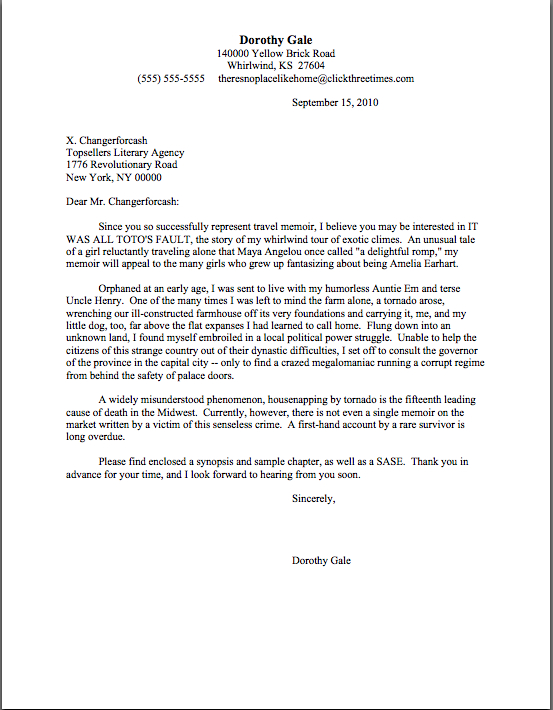
Another name-dropping method that tends to work even better — if, again, the claim made in the letter is true — is to garner a referral from one of the agent’s current clients. See how easily Dorothy is able to use such a referral to personalize the basic query she already had on:
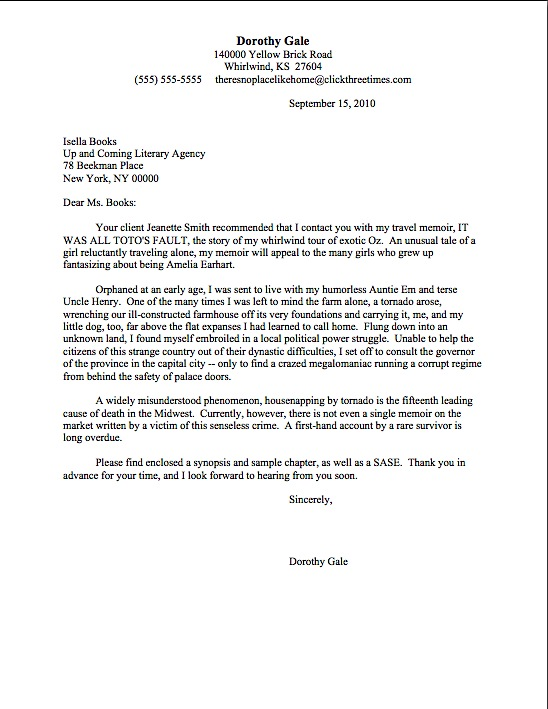
As with every other type of personalization, though, the primary danger inherent to mention a recommendation in a query is that it is invariably disastrous if a writer inadvertently sends that recommendation to the wrong agency — and yes, Virginia, that happens all the time. Due to the ease and consequent popularity of copy-and-paste word processing technology, a tired Dorothy is very, very likely to send precisely the letter above to two different agents without realizing that she’s done it.
Why is the probability so high? Because, like so many queriers anxious to send out as many letters to as many agents as rapidly as possible, our Dorothy simply copies the contents of one e-mail into the body of another and presses SEND. Why, look: she’s done it again now.
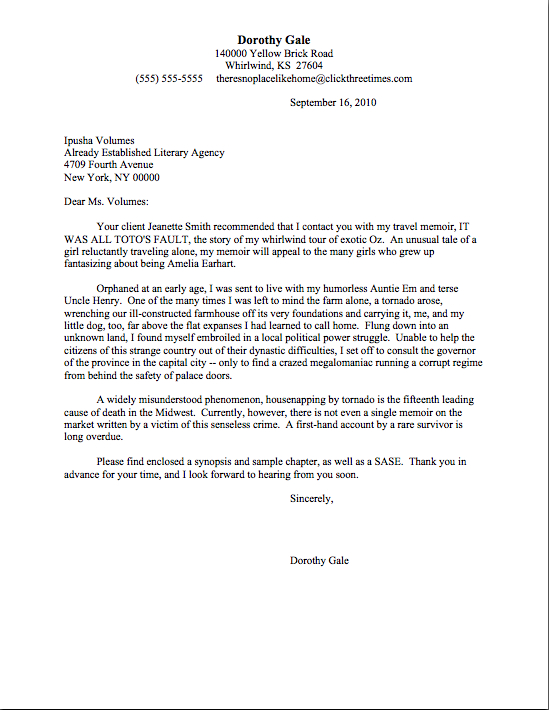
Dorothy may never learn of her error, due to the ubiquity of stock rejections devoid of any explanation of why Millicent chose to pass — but a good screener undoubtedly will. The invariable response: “Next!”
Even if Millicent’s overworked (and usually underpaid as well) eyes do by some divine act of Providence happen to glide past the reference to some other agency’s client, this second query would have gotten rejected in Ms. Volumes’ office, anyway. Any guesses why?
That was sort of a trick question; you’d have to have looked at the two agency’s guidelines to figure out that the problem was the enclosed pages. While Ms. Books’ agency’s specify that queriers may include chapters and a synopsis in their query packets, Ms. Volumes’ agency’s submission guidelines quite clearly reads query only, please.
Hmm, if only there had been a way around this problem…oh, wait, there was: do your homework. Remember, not every agency wants to see the same thing in a query packet; assuming that they all do is an easy-to-spot sign of inexperience.
So is sending a letter clearly intended for one agent to another. That, too, is simple to avoid: read every syllable of everything you send to every query IN ITS ENTIRETY and OUT LOUD, every time. And if you can print a draft copy to read IN HARD COPY, so much the better.
Why, yes, adding both of those tasks to your querying process would render it more time-consuming, now that you mention it. But isn’t that vastly preferable to the horrifying alternative?
Since e-queriers are so much more likely to fall prey to the aforementioned horrifying alternative, I’m happy to pass along a strategy tip from inveterate commenter Dave:
Might I suggest that folks querying by e-mail write and perfect the query letter in Word or their favorite word processing program? They can print it out, read it aloud, and make sure it’s perfect. Then when it is time to send the query, merely copy and paste into the e-mail. At this point, before hitting SEND, it might also be a good idea to correct any formatting anomalies that may have occurred during the pasting operation.
I find this excellent: Dave’s strategy also permits greater ease in spell- and grammar-checking than most e-mail programs allow. (You were already aware that most Millicents are instructed to become wary at the first typo in a query and to stop reading after the second, right?) While it may not completely obviate the possibility of mixing up which personalization should be heading to which agency, merely adding another layer of review renders it less likely.
But let’s get back to name-dropping, shall we? As I mentioned in passing above, if you mention a famous person or someone the agent might conceivably know, it’s imperative that you not stretch the truth about what they might have said about you or your work. Not even a little.
Your mother was right, you know: honesty is the best policy. The more potentially impressive a kudo, the more likely Millicent is to wonder about its veracity — and the more likely her boss is to reach for the phone to double-check.
To those of you who just turned pale: serves you right. If the person you are quoting in your query would not be willing — nay, pleased — to hear that you are capitalizing upon her name to land an agent, you shouldn’t be doing it. It may seem like a harmless prank, but trust me on this one: if an agent asks your ostensible recommender why she sent you to him, and the answer is, “Wait — what makes you think I sent him to you?” your query is toast.
So is your reputation, if the Millicent who handles the query finds the quote outrageous enough to turn the attempt into an anecdote. Choose your quotations with care, and assume that the agency will follow up.
Speaking as someone whose name has been known to turn up in queries penned by writers of whom I have never heard (you know who you are, presumptuous readers: my agency doesn’t appreciate it, and neither do I), I have to say, those follow-up calls and e-mails are a trifle unnerving to receive. Like many authors, I meet literally hundreds of aspiring writers in any given year; although I keep records of whom I refer and where, there’s always the nagging fear that I might have forgotten someone.
Unethical queriers prey on that fear, relying upon poverty of memory and laziness of fact-checking to make their sleight-of-hand pay off. And that’s a pity, because this type of name-dropper makes it harder for people like me to refer aspiring writers whose work I honestly do believe my agent might enjoy.
You’re making everyone look bad, Dorothy. Clean up your act, or at least snatch a few hours’ sleep between Query #37 and Query #38.
Do be careful, too, about taking an established author’s comments out of context; if asked, the commenter may well become offended if those nice things she said about your writing were not about the book you’re querying. Not every bon mot that falls from the lips of the famous is fair game to co-opt for promotional purposes, after all.
When I was in graduate school, for instance, I took a seminar with the late Saul Bellow. At the end of the year, I was delighted to see that he had scrawled on the bottom of my term paper, “Your writing is very likable.”
Now, that awfully nice to see, of course; I don’t know about you, but when a Nobel laureate says something positive about my writing, I sit up and take notice. However, would I have been justified in saying Saul Bellow said my writing was very likeable in every query letter I sent out for the rest of my natural life?
Of course not. The man was talking about a 30-page seminar paper I had written on the novels of Italo Svevo, for heaven’s sake, not — and this would be the implication, if I had ever included his comment in a query letter — one of my novels. Even now that Professor Bellow has joined the choir celestial and could not possibly contest my taking his statement out of context, I would not dream of using it in a query or as a jacket blurb.
Oh, that second use hadn’t occurred to you as a possibility? Congratulations: you’re more ethical than a lot of writers. I can’t even count the number of times established authors have said within my hearing, “Wait — when did I say this? Did I even read this book?”
Even scrupulously ethical name-droppers can — and do — run into other kinds of trouble: all too often, they get carried away with the proper nouns, positively littering the page with them. They forget that the power of celebrity lies in its relative rarity: if a writer can legitimately cite one famous fan of his own work, that’s impressive, but if he lists several, even if they are all genuine fans, it’s going to come across as overkill at best and a complicated lie at worst.
Reluctant to believe that more isn’t better? Judge for yourself:
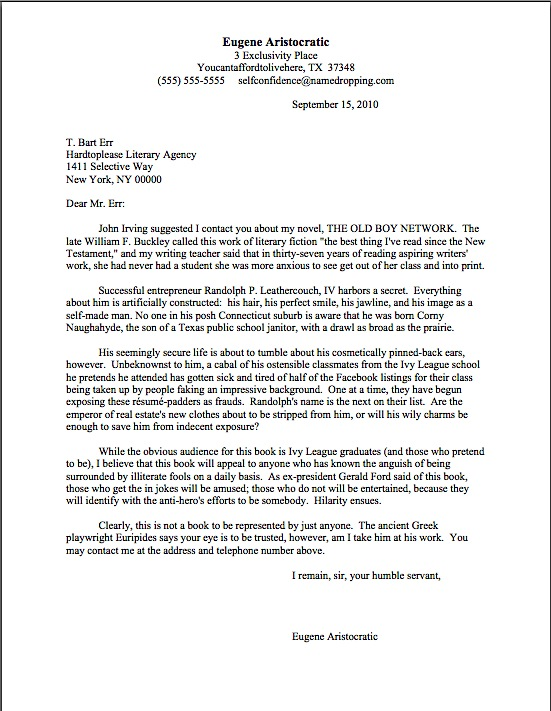
A bit over the top, is it not? One of those famous names might have grabbed Millicent, but so many in a row falls flat. Especially as a couple of those kudos come from unverifiable-because-dead endorsers. And if anyone at Millie’s agency happens to be a personal friend of anyone in that cavalcade of stars — not at all beyond belief; the literary world is smaller than most people think — you can bet that that person will take great pleasure in dropping them an e-mail to ask, “So how do you know this Eugene Aristocratic? He didn’t mention why you thought he might be a good fit for our agency, and I was curious.”
And what do you think happens if the late William F. Buckley — or, indeed, anyone Eugene chose to cite in this all-star line-up — says something like, “Eugene who?”
That’s right: “NEXT!”
On the bright side, although this is a notorious agents’ pet peeve, perjured name-droppers generally receive precisely the same form-letter rejection as everybody else; while professional readers will regale one another with tales of outrageous imposition, it’s relatively rare that the actually perpetrators will be on the receiving end of a well-deserved tongue-lasting. So the wonder is not the fact that people like that never learn, but that after all this time, Millicents across New York have not banded together to come up with a checklist of the most egregious insults to their intelligence commonly found in letters. Imagine how helpful it would be to the clueless if a Millicent could simply grab a list from a photocopied stack, circle doubtful references, and tuck it into the SASE along with the form-letter rejection?
Another pet peeve that would well deserve circling: who?. This feedback would be a boon to name-droppers who reference people of whom Millicent has never heard. Like, say, the writer of this sterling missive:
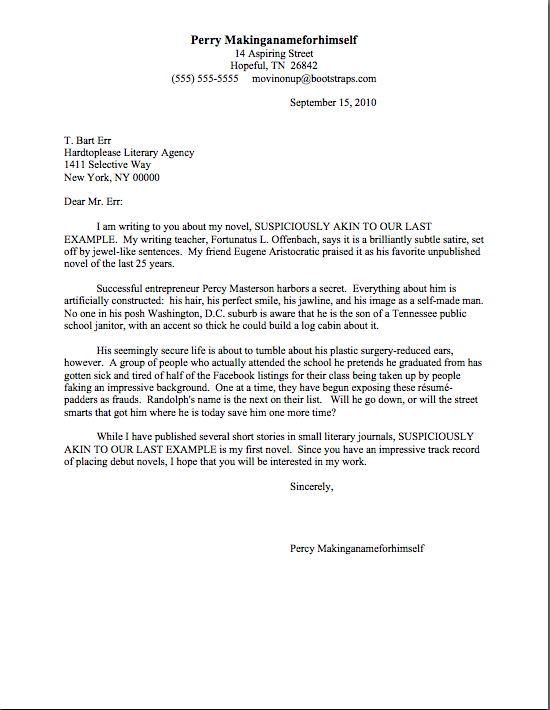
“Who the heck is Fortunatus L. Offenbach?” Millicent mutters, reaching for a form letter. “Why should I care about his opinion on anything? While I’m speculating aloud, isn’t this book description rather similar to the one I read just a few minutes ago — and wait, isn’t the second name here the same as the writer on the other query? Who stole whose book idea, I wonder?”
Oh, yes, our Millie’s memory for text is that good; professional readers can sometimes remember individual phrases for years on end. Even if any particular screener’s brain isn’t that retentive, you never can tell whose query she will read just before or just after yours, Eugene.
Connections to the glamorous (or, in Perry’s case, the not-so-glamorous) are not the only query statements that occasionally strike Millicent as far-fetched. As inquisitive and incisive reader Adam points out,
Isn’t there a danger of stretching too much about connections of importance (i.e. penchant for linguistics resulting in witty character names, thesis about Jane Austen gives specialization of domestic inertia and idle chatter, etc)? Might this kind of tack be harder with genre fiction (more difficult, not impossible), or only mean said query-candy-makers need to be more creative/selective?
I don’t see any special reason that coming up with Eye-Catching Query Letter Candy should be harder for genre fiction than any other variety, Adam. It’s just that in general, fiction writers tend to experience more difficulty in figuring out how to query their work. Since nonfiction writers have to write book proposals, they are less inclined than novelists to try to turn the entire query into a plot summary for the book.
Then, too, the subject matter of fiction is frequently less conducive to the kind of easily-quantified statement that fits nicely into a target audience paragraph. However, while a statement like one out of eight book-buyers in the U.S. suffers from dyslexia is quite a bit easier to work into a query for a dyslexic’s memoir than a science fiction novel where one of the 18-member space crew happens to be dyslexic, it’s actually not a bad statistic to include with either.
Hey, readers like characters that reflect the realities of their own lives; witness the huge popularity of Percy Jackson in THE LIGHTNING THIEF. It’s easier to identify with a character with whom the reader shares traits, likes, dislikes, and/or problems.
Which leads me, not entirely coincidentally, to a tip for coming up with convincing selling-points for your novel: rather than just thinking in terms of what might make you, the writer, sound more professional or literary-minded to Millicent, try brainstorming about what aspects of the book might make it appealing to the reader.
For instance, having written one’s thesis on Jane Austen wouldn’t actually be much of a selling point unless you happened to have written an Austen-themed book, right? So that wouldn’t be the strongest thing to mention in a credentials paragraph in a science fiction query. (And even if you did want to mention your master’s degree, it would make more sense coming in the platform paragraph than lolling about amongst the book’s selling points.) But if a major character is a passionate bocce player, it might well help pitch your book to find out just how many bocce players there are in this country — I can tell you now that unless Millicent comes from a family of bocce enthusiasts, her guesstimate will be low — and whether they ever have authors come to speak between matches.
Try to stick to selling points that might actually influence a book buyer’s decision-making process (hey, bocce players’ loved ones have to get them something for Christmas, right? Why not a bocce-themed novel?), rather than something that contributed to the writing process. All too often, queriers will waste valuable page space with statements like this:
I decided to write about competitive bocce after many years of deliberation — many of these characters are based on real people, and believe me, the last thing you want is to annoy someone gifted with that much accuracy in hoisting projectiles.
That might well be true, but why would anyone but the writer himself and the soon-to-be-outraged bocce players care that the querier had reservations about producing this book? More to the point, how is this information relevant to Millicent’s decision about whether to ask for pages? How would it be relevant to a reader’s decision about whether to pick the book off a shelf?
In fact, it isn’t, in either case, however important it may be personally to the writer. To return to Adam’s example, why would a reader care how the writer came up with the names before she read the book? That’s the kind of information that belongs in a post-publication interview, not a query.
Besides, it’s always dicey to review one’s own writing in a query; Millicent wants to be shown that you can write, not told. So referring to one’s own name choices as witty probably is not the best strategy for convincing her that you are indeed possessed of wit. Making the query itself sparkle with wit is a much better bet.
Remember, though, that both the target audience and platform paragraphs are optional. While being able to argue that your book has an easily-identified target audience and/or that you have the perfect background to have written your novel are very helpful to include, don’t force it. If a selling point or credential feels like a stretch to you, it probably will to Millicent as well.
So what’s an honest, ethical writer to do if she genuinely can’t come up with any selling points and has no relevant background to include in her platform paragraph? Omit ‘em.
There’s no law that says a query must be a full page long, you know. Just say as much as you need to say to convince Millicent you’ve written an interesting book in a category her boss represents — and hope for the best.
All that being said, there’s another reason Millie might have rejected Eugene’s name-dropping query — did you catch it? Because the letter’s larger sins might have distracted you, here it is again for your perusing pleasure.

Did you catch the typos, especially in that last paragraph? Millicent would have. So would Eugene, had he — feel free to chant it along with me, campers — taken the time to read his query IN HARD COPY, IN ITS ENTIRETY, and OUT LOUD. And because he didn’t, do you think Millicent — who might herself be a graduate of an Ivy League school, or an intern still attending one, or the sibling of one or the other — is more or less likely to respond positively to Eugene’s smarter-than-thou tone?
Uh-huh. Had Eugene been anywhere near as smart and witty as he thought he was, he would have let his writing demonstrate those admirable traits all on its own. Wit, like talent, is better shown than told.
Words to live by, I think. Keep looking on the bright side, everyone — and keep up the good work!
